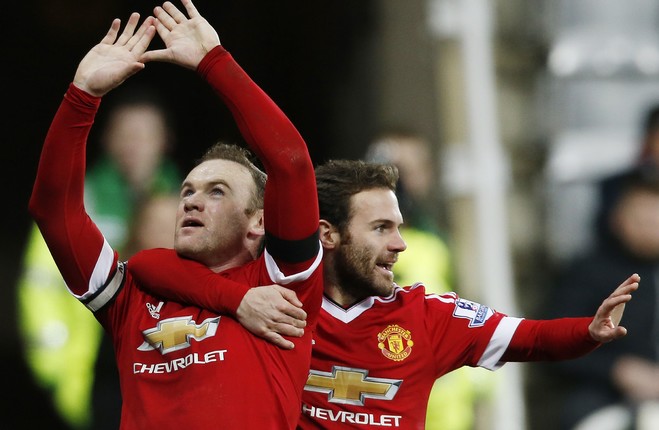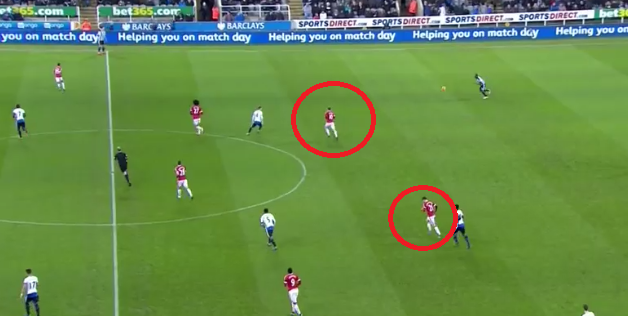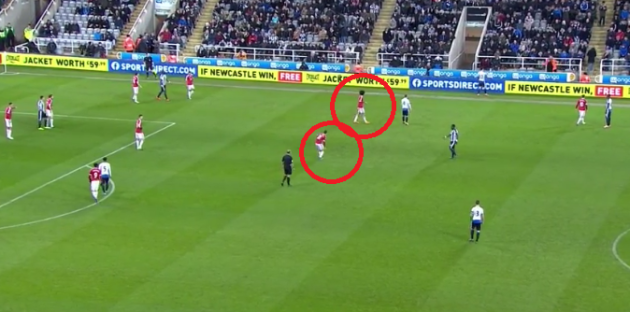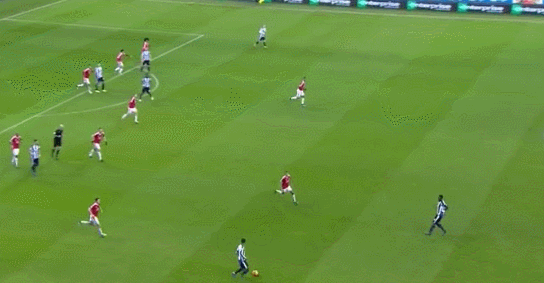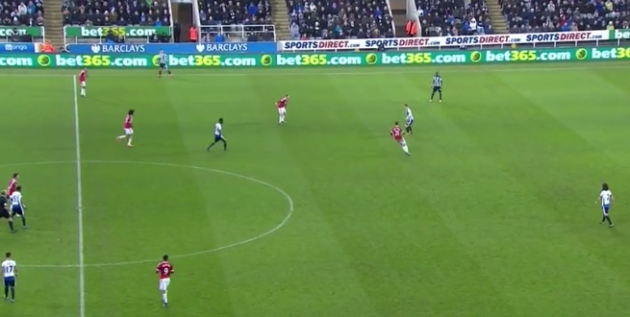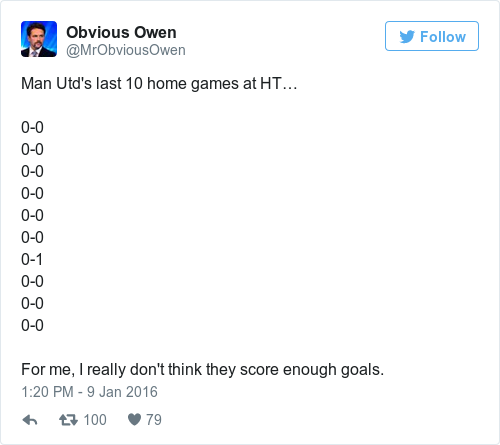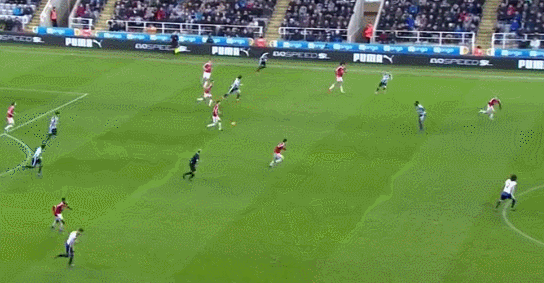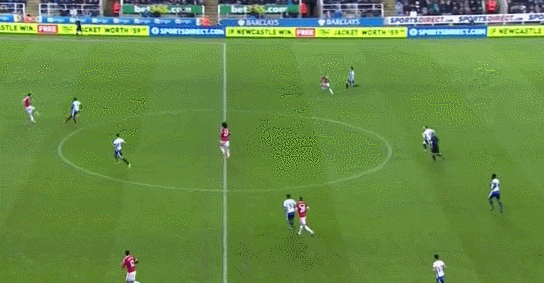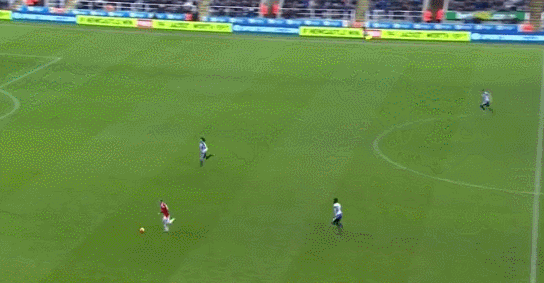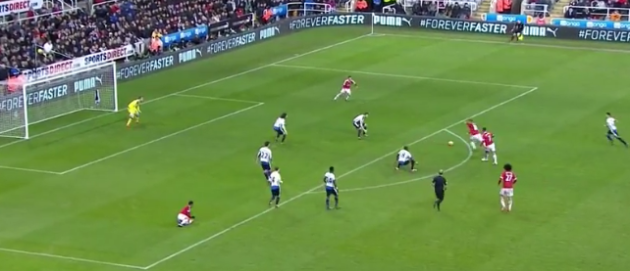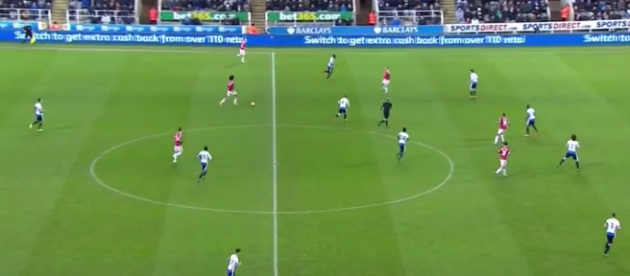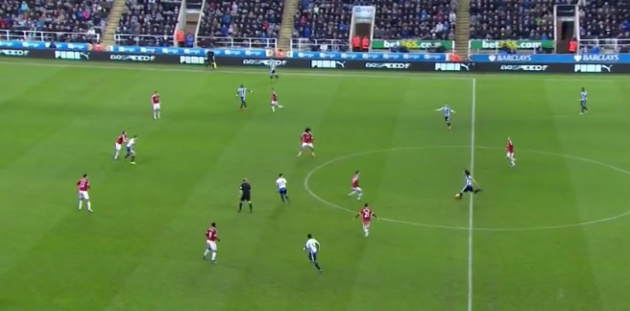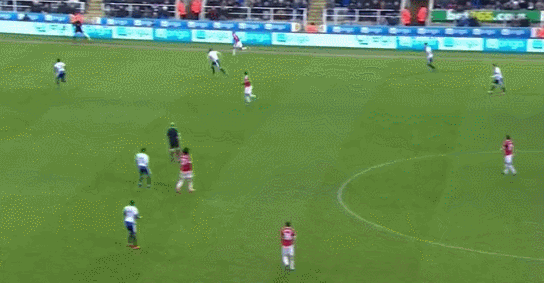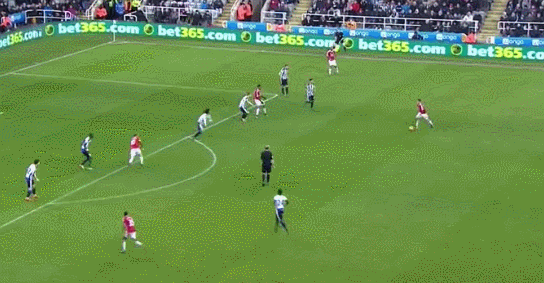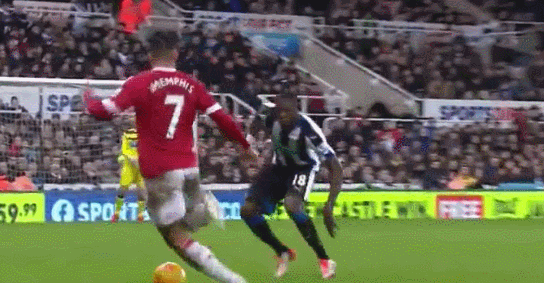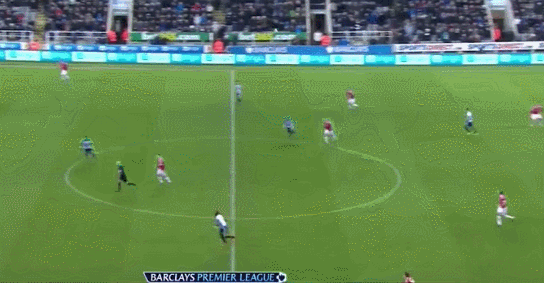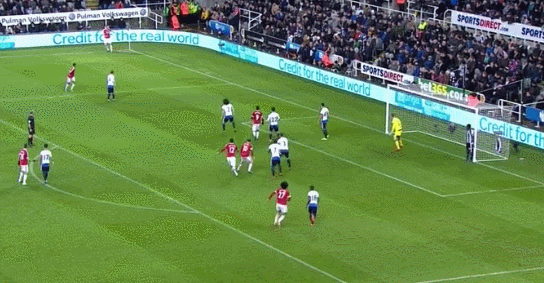ON THE BACK of their 3-3 draw with Newcastle, Manchester United’s attack is being hailed as a revitalised force.
But was their improvement largely aided by Newcastle’s cavalier tactics and error-prone defence? We assess last Tuesday’s memorable Premier League game in detail below.
Formation
Following the dismal 1-0 win over Sheffield United, Juan Mata was dropped with Jesse Lingard coming into the United team. Having been rested for the FA Cup game, Morgan Schneiderlin was brought back into midfield, and with Bastian Schweinsteiger out out on account of a knee injury, Marouane Fellaini retained his place in central midfield.
Wayne Rooney led United’s attack, with Lingard and Anthony Martial on the wings, while Ander Herrera was named in the number 10 role. Fellaini and Schneiderlin sat in midfield, with full-backs Ashley Young and Matteo Darmian given licence to push forward on a regular basis.
Meanwhile, as expected, Chris Smalling, Daley Blind and David de Gea retained their places at the back and in nets respectively.
Attack-minded start
Perhaps conscious of the heavy criticism aimed at their recent uninspired displays, Man United began Tuesday’s match with a noticeable energy and positivity.
At times, Louis van Gaal’s side essentially played a 4-4-2, with Herrera pushed right up alongside Wayne Rooney, while Fellaini was also seemingly encouraged to roam forward at times (see below).
The Red Devils also switched attacking formation in the closing minutes, as Martial moved up top, Rooney switched to the number 10 role, while substitutes Mata and Memphis Depay occupied the flanks.
The visitors started with the type of energy and enthusiasm that they have been lacking at times this season, as emphasised by their impressive pressing of Newcastle in the early stages.
Notice how well United have closed the space and how limited Jack Colback’s options are in the image below.
Therefore, there were certainly positives for Louis van Gaal to take from the performance, as United had the look of a team who were playing for the manager. The Red Devils demonstrated the type of intensity that, for instance, Chelsea invariably lacked during the final few games of Jose Mourinho’s reign.
Newcastle tactics facililitate United improvement
United’s problems in attack have been well documented in recent weeks. Against Newcastle, however, the consensus seemed to be that Louis van Gaal’s side had miraculously solved their issues overnight.
Paul Scholes described his club as “loads better” after the game, while BT Sport commentator Jon Champion felt as if we were “watching a different team” from the one that appeared in previous weeks.
The overriding narrative was that Louis van Gaal had ‘let United off the leash’ and they were suddenly again able to play the type of vintage attacking football that they routinely employed during the many high points of the Alex Ferguson era. The reality, however, is far different.
Granted, United were impressively clinical at times, scoring three goals from four shots on target, but talk of their rejuvenation has been exaggerated.
As poor as the Red Devils have often been going forward this season, it is not the first but the fourth time that they have scored three goals in a single Premier League game. The other three games in question were against Everton, Liverpool and Sunderland.
They succeeded in opening up a defensively awful Sunderland side, but what the other three matches in question have in common is that they all involved sides who were willing to come out and play attacking football themselves.
United’s main problem this season has been opening up sides who stick 11 men behind the ball. It partially explains why they have scored more goals away from home (15) than at home (12), with opposition teams more likely to attack regularly on the former occasions.
Steve McClaren’s side, perhaps buoyed by their opponents’ recent unconvincing form, showed little interest in purely sticking numbers behind the ball, and instead adopted an adventurous approach. Consequently, the likes of Rooney, Martial and Lingard enjoyed the type of freedom and space that they seldom if ever get at Old Trafford.
Newcastle frequently conceded possession in dangerous areas and left themselves exposed, with the lightning pace of Martial and Lingard regularly testing the Magpies’ defence.
Rooney, meanwhile, was left one-on-one with Fabricio Coloccini, most notably for the second goal, but on a number of other occasions too.
Notice (below) the space Rooney was afforded for United’s third goal, scored on the counter attack, as tired Newcastle bodies struggled to get back to alleviate the danger.
Usually at that point of the game (79 minutes), United are confronted by a sea of bodies all perfectly positioned to minimise the space, thereby considerably reducing any chance of an opening.
So United were better in attack on Tuesday, but only because they were allowed to be better, owing to Newcastle’s ambition — something which sides playing the Red Devils often eschew.
Instead of sitting deep, Newcastle played with a relatively high line at times (see below). In most matches at Old Trafford, by contrast, there is rarely any space for the speedy likes of Martial, Lingard and Depay to run into. Conversely, on this occasion, there was ample opportunity to expose the hosts’ vulnerable back four, and they certainly capitalised with three well-taken goals.
And United, similarly, were intent on going for the win, and generally refused to sit deep, even when they held the lead.
But of United’s three goals, it’s difficult to imagine the final two counter-attacking strikes being scored at Old Trafford (unless a team was really chasing the game), while the opening goal was handed to them (in a somewhat literal sense), owing to a moment of defensive panic in the Magpies box. Chancel Mbemba was deemed to have stopped Fellaini’s header illegally, with the referee awarding a penalty as a result, as United and Rooney got off to the perfect start.
And although there were some reasons to be optimistic, it remained a deeply flawed performance from United. They never really controlled the game, and thus, there was no coherence to their attack play. Instead, they were reliant on Newcastle making a mistake in possession, or the occasional flash of ingenuity from a player like Rooney or Martial.
Tuesday’s game was perhaps most reminiscent of United’s 5-3 loss to Leicester last season. A kind of chaos permeated the match at times, and Newcastle could have easily won this encounter 5-3 as well, given that they missed one or two big chances and were denied a clear penalty in the first half, when Daryl Janmaat went down under Lingard’s clumsy challenge.
Pragmatism mixed with risk
Despite the aforementioned caveats, there were undoubtedly signs of positivity during United’s display.
Some critics have accused the Red Devils of seldom incorporating “risk” into their play, but this criticism didn’t really apply at St James’ Park the other night.
Even though it didn’t always work out, the likes of Herrera (who was very influential throughout) and Young were not afraid to try to beat their man or attempt an incisive through pass (see below).
And naturally, Van Gaal’s side’s positive mentality did sometimes pay off, resulting in clear chances being created, as illustrated by substitute Memphis Depay’s good play to set up Fellaini’s header below.
And though there were exciting moments of considerable skill in the game, Van Gaal also adopted a level of pragmatism that invariably characterises United teams these days.
Marouane Fellaini’s height was frequently utilised, from set pieces and goal kicks in particular.
Accordingly, despite Van Gaal’s supposed obsession with possession-based football, the Dutch coach is clearly not averse to going long when he deems it necessary. And in fact, Newcastle had much more of the ball over the course of the game, as they had 54.2% of the overall possession, and made 514 passes compared with their opponents’ 432.
A club of United’s stature may be a little embarrassed at having to rely on such unsophisticated tactics, but there is no doubt they can be effective, and Fellaini certainly represents more of a goal threat than the more elegant likes of Michael Carrick and Bastian Schweinsteiger in central midfield.
Conclusion
Although any attack that scores three goals in one game deserves praise, United have not necessarily fixed their underlying problems in opponents’ final third.
In stark contrast to recent far more dull matches involving Louis van Gaal’s team, Newcastle’s determination to attack at will facilitated the Red Devils’ significant improvement going forward.
Granted, Wayne Rooney produced probably his best performance of the season, and Ander Herrera and Jesse Lingard also had especially influential displays — factors that will give the team confidence going forward if nothing else — but whether United can look anywhere near as sharp or threatening against teams that park the bus in future remains to be seen.
Liverpool are not a side that favours sitting back, and so United’s clash with Jurgen Klopp’s side on Sunday could well be another goal-fest. Nevertheless, further down the line, the old familiar problems seem likely to recur, and so Van Gaal’s team could well add to their current incredible record of 10 consecutive home matches without a first-half goal.
